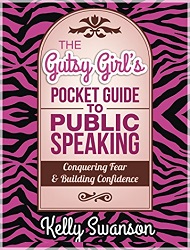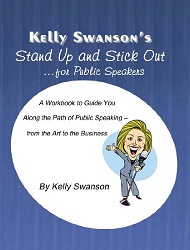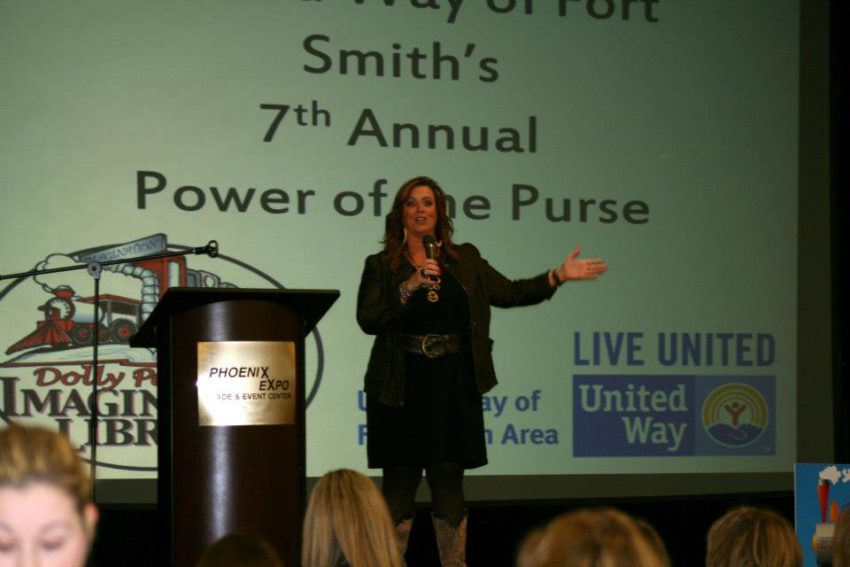Last updated on December 29th, 2023 at 02:29 pm
 So, your big dream is to become a motivational speaker … here’s my advice for overcoming stage fright when it hits.
So, your big dream is to become a motivational speaker … here’s my advice for overcoming stage fright when it hits.
When I was pregnant and taking childbirth classes, the instructor told us that when the pain hits, we should not fight it but ride the wave instead. I thought she was crazy. I was choosing drugs, baby, all the way. (Old habits die hard.) In the long hours leading up to the actual delivery, before I would get the drugs, there was a lot of pain.
I remember the waves of pain, how I would grit my teeth, hold my breath, and how my entire body would tense up as I would fight this pain. It didn’t work. And then I remembered what the instructor said, “Don’t fight it, ride the wave.” I had no idea how to do that, but I decided it was worth a try.
When the next pain hit, I forced myself actually to relax into it and breathe. I pictured myself riding the pain like an ocean wave into the shore but without all the sand. (Not a good image picturing me in that bathing suit.) But it worked! The pain didn’t disappear entirely, but I was able to handle it better when I didn’t fight it.
This is what I have learned about stage fright and the other fears of speaking on a stage.
Fight or Flight
Our tendency when we are afraid is to fly or fight. What if we didn’t choose either? What if we choose to ride the wave instead? To close our eyes and breathe? To lean into the pain instead of wrestling with it?
Next time you face an incident of public speaking fear again, try something different. Don’t fight it. Don’t tense. Don’t hold your breath. Close your eyes. Breathe deeply in and out. Picture an ocean wave rolling into shore. Instead of standing up against that wave, turn and ride it all the way in. Your fear might not disappear, but it will be easier to handle and won’t stay as long.
And if it works, try it with someone who says they think you’ve put on weight.
All humor aside, overcoming stage fright is a common challenge among speakers and actors alike, and implementing specific strategies like deep breathing can significantly help.
8 More Tips for Managing Stage Fright for Motivational Speakers:
1. Practice, Practice, Practice
Familiarity breeds confidence. Rehearse your presentation multiple times until you feel comfortable with the material. This helps you remember your content and builds confidence in your delivery.
2. Visualization
Before taking the stage, close your eyes and visualize yourself giving a successful presentation. Picture the audience engaged and responsive. This positive mental imagery can help reduce anxiety and boost your confidence.
3. Use Humor to Your Advantage
Integrate humor into your presentation. A well-timed joke or a light-hearted anecdote can not only engage your audience but also help diffuse tension, including your own. Humor can create a positive atmosphere, making both you and your audience more comfortable. Just ensure that the humor aligns with your message and is appropriate for the context.
4. Focus on the Message, Not Yourself
Shift your focus from your own anxiety to the message you want your story to convey. Concentrate on the value you’re providing to your audience rather than worrying about how you’re perceived. This change in perspective can alleviate self-consciousness.
5. Use Positive Affirmations
Replace negative thoughts with positive affirmations. Remind yourself of past successes, acknowledge your strengths, and affirm that you are well-prepared. Positive self-talk can boost your confidence and combat self-doubt.
6. Connect with the Audience
Establish a connection with your audience. Make eye contact, smile, and engage with individuals. When you feel a personal connection, the audience becomes less intimidating, and you may find it easier to navigate through your presentation.
7. Warm Up Your Body
Physical tension often accompanies stage fright. Perform simple physical warm-up exercises to release tension. Stretch your neck, shoulders, and arms to loosen up your muscles and promote a more relaxed posture.
8. Accept Imperfection
Understand that no presentation is perfect, and everyone makes mistakes. Embrace the possibility of imperfections, and rather than dwelling on them, focus on maintaining a positive and adaptable attitude. Audiences are often forgiving and appreciate authenticity.
Remember, overcoming stage fright is a gradual process, and every motivational speaker finds different strategies that work best for them. Experiment with these tips and adjust them to suit your personal preferences and public speaking style. With practice and persistence, you’ll likely find a combination that helps you manage stage fright effectively.
 |  |  |  |
|---|
Kelly Swanson is an award-winning storyteller, comedian, motivational speaker, Huffington Post Contributor, and cast member of The Fashion Hero television show airing on Amazon Prime. She is also the author of Who Hijacked My Fairy Tale, The Land of If Only, The Story Formula, and The Affirmation Journal for Positive Thinking. She was a featured entertainer for Holland America Cruise Lines, keynote speaker for the International Toastmasters Convention, and has keynoted major conferences and corporate events from coast to coast. She just launched her one-woman show Who Hijacked My Fairy Tale in theaters, and it is being booked all over the country. In July of 2022, she was inducted into the National Speakers Association Speaker Hall of Fame.
Note: Articles by Kelly may contain affiliate links and may be compensated if you make a purchase after clicking on an affiliate link.




